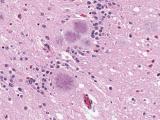Feb 9, 2005 (CIDRAP News) To help prevent the spread of variant Creutzfeldt-Jakob disease (vCJD) in the United States, a federal advisory committee recommended yesterday that anyone who received a blood transfusion in France after 1980 should not be allowed to give blood.
The recommendation was prompted by reports that two Britons might have contracted vCJD, the human equivalent of bovine spongiform encephalopathy (BSE), or mad cow disease, after receiving blood transfusions from people who later fell ill with the disease, according to Food and Drug Administration (FDA) documents.
The FDA recommended in 2002 that blood banks not take blood and plasma donations from people who received blood transfusions in the United Kingdom after 1980. Most of the approximately 150 vCJD cases reported worldwide have occurred in the UK. The two vCJD cases apparently linked with blood transfusions were reported in 2003 and 2004.
The FDA's Transmissible Spongiform Encephalopathies Advisory Committee voted 12-3, with one abstention, to recommend against blood donations from people who have received transfusions in France, according to an Associated Press (AP) report. But the panel voted 15-0, with one abstention, to reject a plan to ban donations from people who had received transfusions anywhere in Europe.
France has had nine cases of vCJD and reported last year that blood from an infected person was given to 10 people and used in medical products, the AP report said. French authorities recommended in 1998 that blood not be accepted from people who have had transfusions, according to the FDA issue summary prepared for the committee meeting.
According to the AP story, committee member Richard T. Johnson, a Johns Hopkins University neurology professor, said the panel would "look pretty silly" if a vCJD case in the United States were linked to a French transfusion.
The FDA estimates that barring blood donations from recipients of French transfusions would eliminate 1.4 of 10,000 donors, according to the issue summary. Barring donations from anyone who received a transfusion anywhere in Europe would eliminate 3 in 10,000 donors.
The FDA document suggests that many Americans have received blood from European sources unknowingly. From the early 1970s until 2002, much of the New York City area's blood supply was imported from Germany, Switzerland, and the Netherlands, the report says.
"During its peak period, the Euroblood program represented one third of the New York area RBC [red blood cell] supply and approximately 2.0% of the total US RBC supply," the document states. Without a massive investigation, the recipients of that blood are "largely untraceable."
Barring blood donations from people who received transfusions anywhere in Europe "would not address the US recipients of Euroblood since 1980," the report adds.
See also:
FDA issue summary prepared for advisory committee meeting
http://www.fda.gov/ohrms/dockets/ac/05/briefing/2005-4088B1_03.htm















